Module7 English for you and me Unit3 Language in use课件(共37张PPT)
文档属性
| 名称 | Module7 English for you and me Unit3 Language in use课件(共37张PPT) | 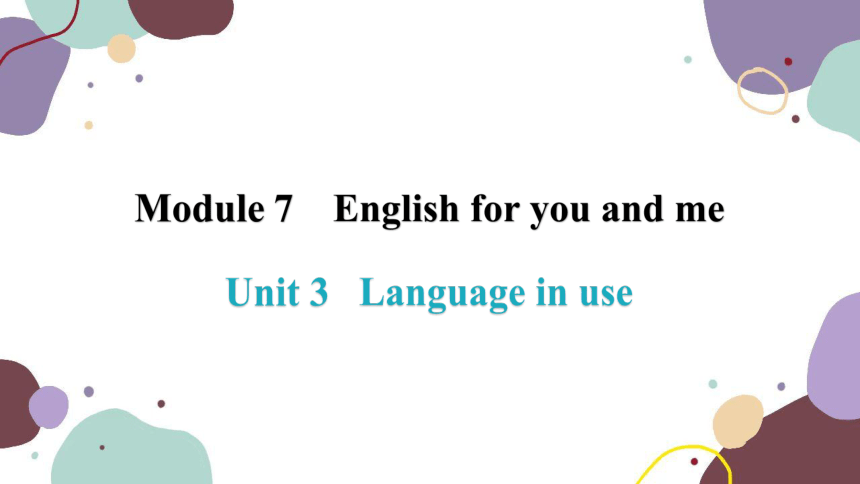 | |
| 格式 | pptx | ||
| 文件大小 | 291.1KB | ||
| 资源类型 | 教案 | ||
| 版本资源 | 外研版 | ||
| 科目 | 英语 | ||
| 更新时间 | 2023-06-23 09:41:13 | ||
图片预览



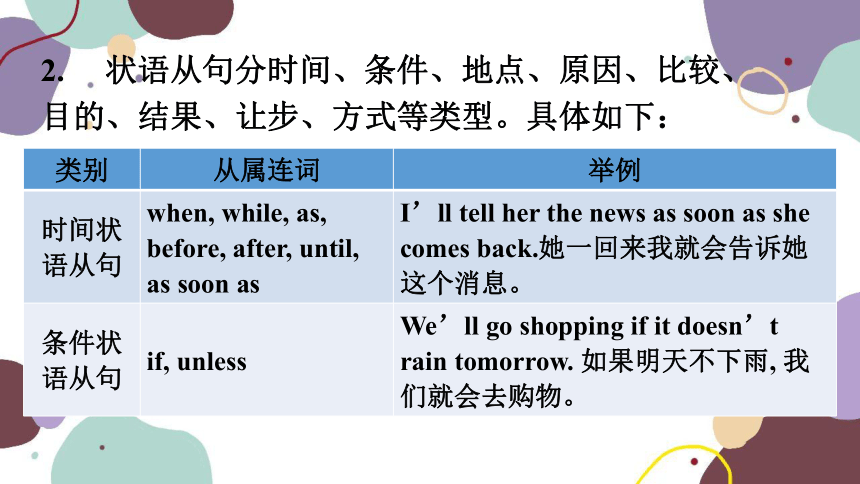
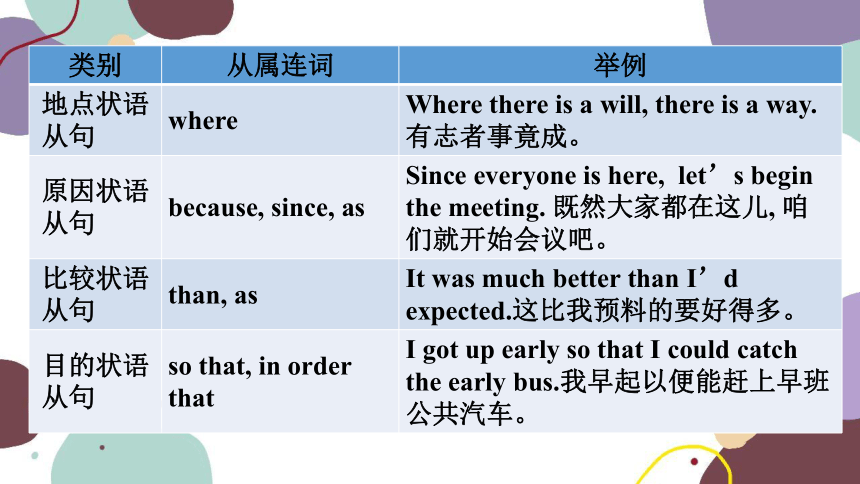
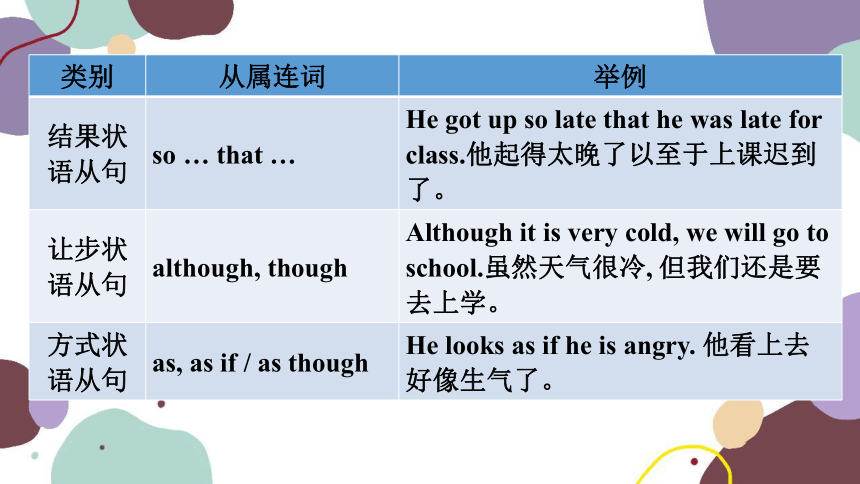

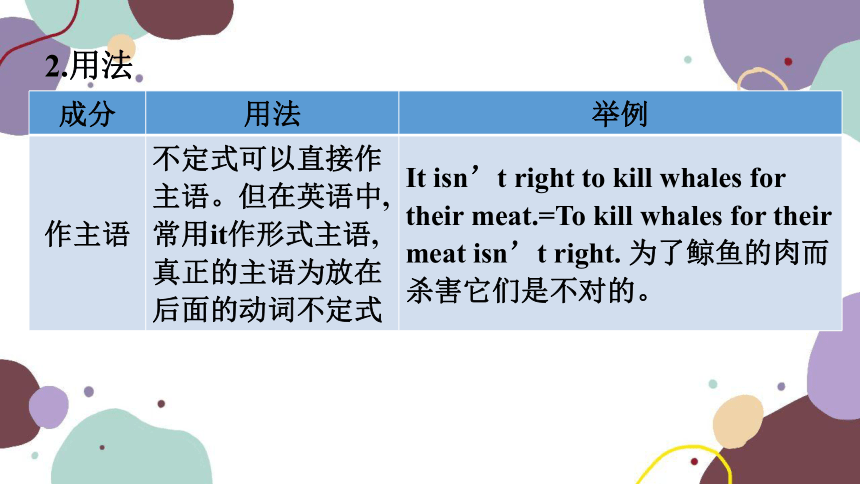
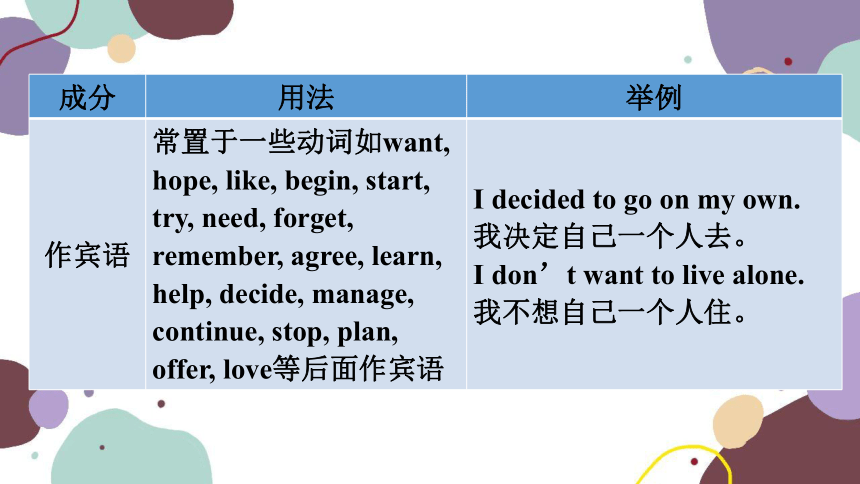
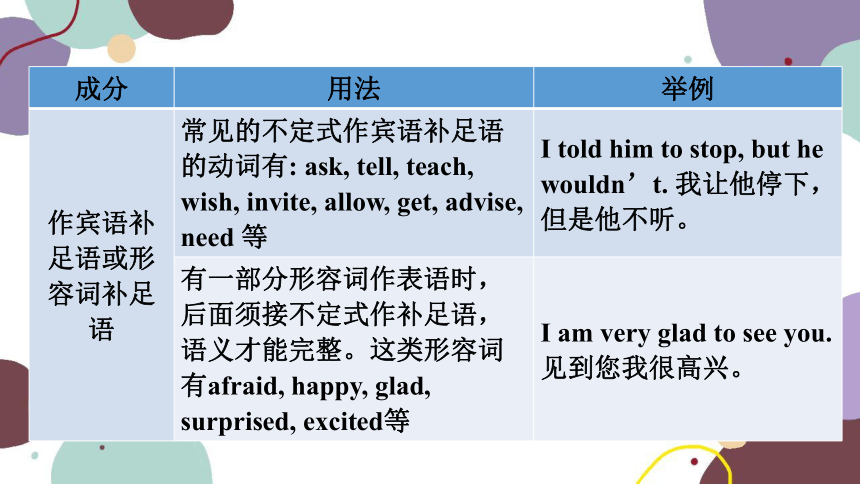
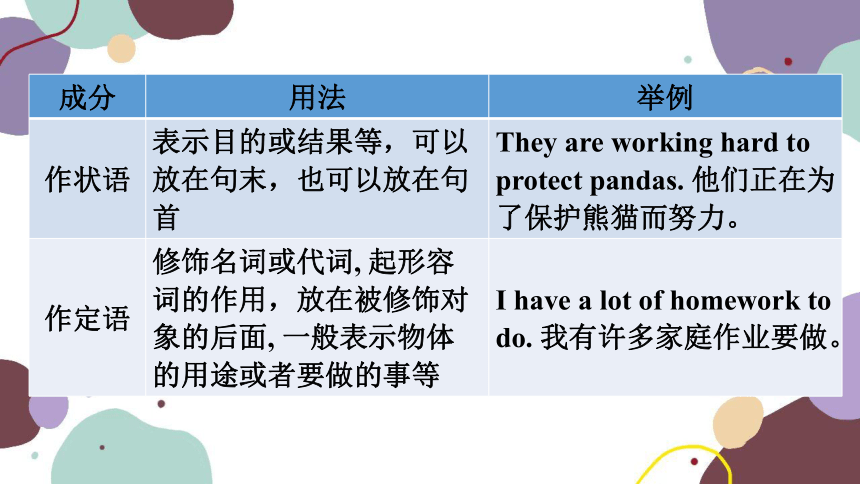
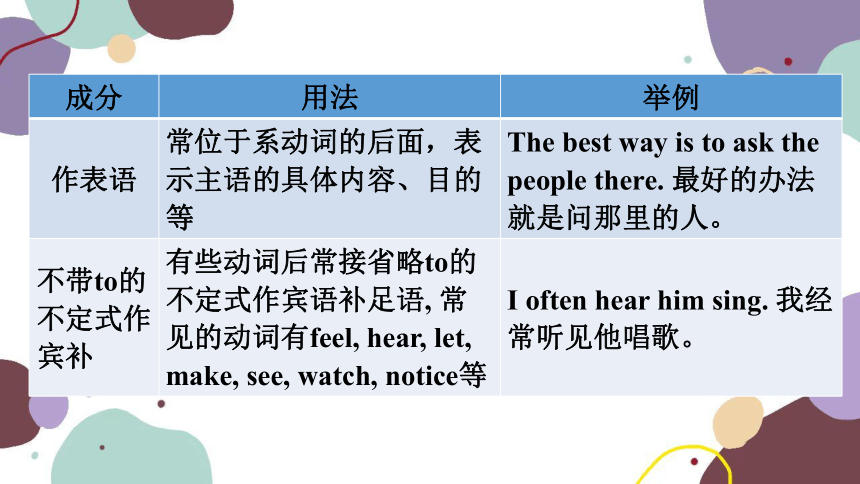
文档简介
(共37张PPT)
Module 7 English for you and me
Unit 3 Language in use
目录
课堂小测
02
课后作业
03
01
语法聚焦
语法聚焦
状语从句和不定式
一、状语从句
1. 定义:状语从句是指句子用作状语时,起副词作用的句子。状语从句可以修饰谓语、非谓语动词、定语、状语或整个句子。
2. 状语从句分时间、条件、地点、原因、比较、目的、结果、让步、方式等类型。具体如下:
类别 从属连词 举例
时间状语从句 when, while, as, before, after, until, as soon as I’ll tell her the news as soon as she comes back.她一回来我就会告诉她这个消息。
条件状语从句 if, unless We’ll go shopping if it doesn’t rain tomorrow. 如果明天不下雨, 我们就会去购物。
类别 从属连词 举例
地点状语从句 where Where there is a will, there is a way.有志者事竟成。
原因状语从句 because, since, as Since everyone is here, let’s begin the meeting. 既然大家都在这儿, 咱们就开始会议吧。
比较状语从句 than, as It was much better than I’d expected.这比我预料的要好得多。
目的状语从句 so that, in order that I got up early so that I could catch the early bus.我早起以便能赶上早班公共汽车。
类别 从属连词 举例
结果状语从句 so … that … He got up so late that he was late for class.他起得太晚了以至于上课迟到了。
让步状语从句 although, though Although it is very cold, we will go to school.虽然天气很冷, 但我们还是要去上学。
方式状语从句 as, as if / as though He looks as if he is angry. 他看上去好像生气了。
二、不定式
1. 定义:不定式是一种非限定动词,通常由“to+动词原形”构成。这里的to是不定式的符号,没有词义,有时还可以省略。动词不定式没有人称和数的变化, 在句中不能单独用作谓语。动词不定式的肯定形式是“to+do”, 否定形式是“not+to+do”。
2.用法
成分 用法 举例
作主语 不定式可以直接作主语。但在英语中,常用it作形式主语,真正的主语为放在后面的动词不定式 It isn’t right to kill whales for their meat.=To kill whales for their meat isn’t right. 为了鲸鱼的肉而杀害它们是不对的。
成分 用法 举例
作宾语 常置于一些动词如want, hope, like, begin, start, try, need, forget, remember, agree, learn, help, decide, manage, continue, stop, plan, offer, love等后面作宾语 I decided to go on my own. 我决定自己一个人去。
I don’t want to live alone. 我不想自己一个人住。
成分 用法 举例
作宾语补足语或形容词补足语 常见的不定式作宾语补足语的动词有: ask, tell, teach, wish, invite, allow, get, advise, need 等 I told him to stop, but he wouldn’t. 我让他停下,但是他不听。
有一部分形容词作表语时,后面须接不定式作补足语,语义才能完整。这类形容词有afraid, happy, glad, surprised, excited等 I am very glad to see you. 见到您我很高兴。
成分 用法 举例
作状语 表示目的或结果等,可以放在句末,也可以放在句首 They are working hard to protect pandas. 他们正在为了保护熊猫而努力。
作定语 修饰名词或代词, 起形容词的作用,放在被修饰对象的后面, 一般表示物体的用途或者要做的事等 I have a lot of homework to do. 我有许多家庭作业要做。
成分 用法 举例
作表语 常位于系动词的后面,表示主语的具体内容、目的等 The best way is to ask the people there. 最好的办法就是问那里的人。
不带to的不定式作宾补 有些动词后常接省略to的不定式作宾语补足语, 常见的动词有feel, hear, let, make, see, watch, notice等 I often hear him sing. 我经常听见他唱歌。
3. 一些常见的不定式句型
句型 举例
主语+be+adj. +to do. This question is difficult to answer. 这个问题很难回答。
It is time to do sth. It is time to go to school. 是时候去上学了。
It takes sb. some time to do sth. It takes me 5 minutes to go to school. 我去学校要花5分钟。
主语+谓语+特殊疑问词+to do sth. I don’t know what to do. 我不知道下一步要做什么。
一、单项填空
( )1. We had a terrible day _____ the weather was so awful.
A. because B. until C. though
( )2. My cousin became a country doctor _____ he finished medical school.
A. after B. so that C. unless
A
A
( )3. Dreams are so powerful that they can make you _____ harder to have a better future.
A. to work B. working C. work
( )4. _____ the online shopping, my grandma bought a smart phone.
A. Enjoying B. Enjoy C. To enjoy
C
C
( )5. The policeman told the children _____ in the river. It’s too dangerous!
A. to not swim B. not to swim C. not swim
B
二、用方框内所给的单词或词组填空
so that, while, though, until, unless
6. Tim didn’t have dinner __________ he finished watching the cartoon.
7. He won’t go to sleep __________ you tell him a story.
8. __________ she’s almost 40, she still looks very young.
until
unless
Though
9. Why don’t you start out early __________ you don’t have to hurry
10. They arrived __________ we were having dinner.
so that, while, though, until, unless
so that
while
课堂小测
一、用所给单词的适当形式填空
1. I haven’t eaten __________ (India) food for a long time.
2. Her __________(speak) English is perfect.
3. More and more foreign people have realised the _________________ (important) of learning Chinese.
Indian
spoken
importance
4. The story happened many __________ (century) ago.
5. English is one of the most important _____________ (language)in the world.
centuries
languages
二、同义句转换,每空一词
6. The box is light enough for the boy to carry.
The box is __________ light __________ the boy can carry it.
7. I don’t know how I can keep my room clean.
I don’t know how __________ __________ my room clean.
so
that
to
keep
8. Mrs White told Tom that he mustn’t throw paper on the ground.
Mrs White told Tom __________ __________ __________ paper on the ground.
9. Hurry up,or you’ll be late for the party.
_________ you __________ hurry up, you’ll be late for the party.
not
to
throw
If
don’t
10. At the age of 18, he started writing his own book.
__________ __________ __________
_________________, he started writing his own book.
When
he
was
eighteen / 18
三、语法选择
Tom hated grammar. It was a hot afternoon and he felt sleepy in an English class. It was a grammar lesson. But Tom just wanted to leave school quickly and play. He sat _____11_____ and looked out of the window. He looked at the trees and flowers. Then he started daydreaming.
( )11. A. quietly B. quiet C. quietness
A
Ten minutes later, the teacher stopped talking. He asked the students _____12_____ some grammar exercises. The students took out _____13_____ exercise books and pencils and started writing. The teacher looked at Tom. He noticed that Tom wasn’t writing, so he asked, “_____14_____ aren’t you writing,Tom ”
( )12. A. do B. did C. to do
( )13. A. their B. them C. theirs
( )14. A. How B. What C. Why
C
A
C
“What, sir ” Tom said.
“_____15_____ up. Stop daydreaming, Tom!” the teacher said loudly.“Why aren’t you ___16___ ”
( )15. A. Waking B. Wake C. To wake
( )16. A. to write B. write C. writing
B
C
Tom thought for a moment and replied,“I aren’t got _____17_____ pencil.”
The teacher looked at Tom and said,“You aren’t got a pencil You mean you don’t have a pencil ” Tom didn’t understand the teacher, _____18_____ he said,“Sorry, sir.”
( )17. A. a B. an C. the
( )18. A. or B. but C. so
A
C
The teacher said_____19_____ an angry voice,“I don’t have a pencil. He doesn’t have a pencil. She doesn’t have a pencil. We don’t have pencils. They don’t have pencils. Tom, _____20_____ you understand ”
( )19. A. in B. on C. to
( )20. A. doesn’t B. does C. do
A
C
Tom thought for a while and said,“My goodness! What happened to all the pencils, sir ”
四、短文填空
I am Canadian. I started _____21_____ French when I was 10 years old. But my whole experience with the language was in the classroom.
learning
All of that changed, however, during my last summer of high school. As a 17-year-old girl, I flew across the country by myself for the _____22_____ time! I headed for Quebec to live in the province with _____23_____ French-speaking host family, who didn’t speak any English. And I would learn French at a local school.
first
a
On the first day of school, all of us students were ____24____ a test to determine(测定) our language level. We were required to speak only French all summer. I made every effort to communicate in a second language by making new friends, seeing movies and even ordering food from restaurants _____25_____ French. _____26_____ I couldn’t understand most of it at the very beginning,
given
in
Though / Although
the whole experience was exciting and refreshing. On weekends, my classmates and I _____27_____ trips to different places around the province.
Finally my efforts paid off (得到了回报)! At the end of the summer, I was able to communicate pretty _____28_____.
took
well
I couldn’t wait to go back to school and talk with _____29_____ French teacher. Being fully immersed (沉浸) in a French-speaking _____30_____ was a valuable learning experience. And it could be the main reason for my improvement in French.
my
environment
21. __________ 22. __________
23. __________ 24. __________
25. __________ 26. ______________________
27. _________ 28. __________
29. __________ 30. ______________
learning
first
a
given
in
Though / Although
took
well
my
environment
课后作业
请同学们完成下册Module 7 Unit 3的所有练习题。
THANKS!
Module 7 English for you and me
Unit 3 Language in use
目录
课堂小测
02
课后作业
03
01
语法聚焦
语法聚焦
状语从句和不定式
一、状语从句
1. 定义:状语从句是指句子用作状语时,起副词作用的句子。状语从句可以修饰谓语、非谓语动词、定语、状语或整个句子。
2. 状语从句分时间、条件、地点、原因、比较、目的、结果、让步、方式等类型。具体如下:
类别 从属连词 举例
时间状语从句 when, while, as, before, after, until, as soon as I’ll tell her the news as soon as she comes back.她一回来我就会告诉她这个消息。
条件状语从句 if, unless We’ll go shopping if it doesn’t rain tomorrow. 如果明天不下雨, 我们就会去购物。
类别 从属连词 举例
地点状语从句 where Where there is a will, there is a way.有志者事竟成。
原因状语从句 because, since, as Since everyone is here, let’s begin the meeting. 既然大家都在这儿, 咱们就开始会议吧。
比较状语从句 than, as It was much better than I’d expected.这比我预料的要好得多。
目的状语从句 so that, in order that I got up early so that I could catch the early bus.我早起以便能赶上早班公共汽车。
类别 从属连词 举例
结果状语从句 so … that … He got up so late that he was late for class.他起得太晚了以至于上课迟到了。
让步状语从句 although, though Although it is very cold, we will go to school.虽然天气很冷, 但我们还是要去上学。
方式状语从句 as, as if / as though He looks as if he is angry. 他看上去好像生气了。
二、不定式
1. 定义:不定式是一种非限定动词,通常由“to+动词原形”构成。这里的to是不定式的符号,没有词义,有时还可以省略。动词不定式没有人称和数的变化, 在句中不能单独用作谓语。动词不定式的肯定形式是“to+do”, 否定形式是“not+to+do”。
2.用法
成分 用法 举例
作主语 不定式可以直接作主语。但在英语中,常用it作形式主语,真正的主语为放在后面的动词不定式 It isn’t right to kill whales for their meat.=To kill whales for their meat isn’t right. 为了鲸鱼的肉而杀害它们是不对的。
成分 用法 举例
作宾语 常置于一些动词如want, hope, like, begin, start, try, need, forget, remember, agree, learn, help, decide, manage, continue, stop, plan, offer, love等后面作宾语 I decided to go on my own. 我决定自己一个人去。
I don’t want to live alone. 我不想自己一个人住。
成分 用法 举例
作宾语补足语或形容词补足语 常见的不定式作宾语补足语的动词有: ask, tell, teach, wish, invite, allow, get, advise, need 等 I told him to stop, but he wouldn’t. 我让他停下,但是他不听。
有一部分形容词作表语时,后面须接不定式作补足语,语义才能完整。这类形容词有afraid, happy, glad, surprised, excited等 I am very glad to see you. 见到您我很高兴。
成分 用法 举例
作状语 表示目的或结果等,可以放在句末,也可以放在句首 They are working hard to protect pandas. 他们正在为了保护熊猫而努力。
作定语 修饰名词或代词, 起形容词的作用,放在被修饰对象的后面, 一般表示物体的用途或者要做的事等 I have a lot of homework to do. 我有许多家庭作业要做。
成分 用法 举例
作表语 常位于系动词的后面,表示主语的具体内容、目的等 The best way is to ask the people there. 最好的办法就是问那里的人。
不带to的不定式作宾补 有些动词后常接省略to的不定式作宾语补足语, 常见的动词有feel, hear, let, make, see, watch, notice等 I often hear him sing. 我经常听见他唱歌。
3. 一些常见的不定式句型
句型 举例
主语+be+adj. +to do. This question is difficult to answer. 这个问题很难回答。
It is time to do sth. It is time to go to school. 是时候去上学了。
It takes sb. some time to do sth. It takes me 5 minutes to go to school. 我去学校要花5分钟。
主语+谓语+特殊疑问词+to do sth. I don’t know what to do. 我不知道下一步要做什么。
一、单项填空
( )1. We had a terrible day _____ the weather was so awful.
A. because B. until C. though
( )2. My cousin became a country doctor _____ he finished medical school.
A. after B. so that C. unless
A
A
( )3. Dreams are so powerful that they can make you _____ harder to have a better future.
A. to work B. working C. work
( )4. _____ the online shopping, my grandma bought a smart phone.
A. Enjoying B. Enjoy C. To enjoy
C
C
( )5. The policeman told the children _____ in the river. It’s too dangerous!
A. to not swim B. not to swim C. not swim
B
二、用方框内所给的单词或词组填空
so that, while, though, until, unless
6. Tim didn’t have dinner __________ he finished watching the cartoon.
7. He won’t go to sleep __________ you tell him a story.
8. __________ she’s almost 40, she still looks very young.
until
unless
Though
9. Why don’t you start out early __________ you don’t have to hurry
10. They arrived __________ we were having dinner.
so that, while, though, until, unless
so that
while
课堂小测
一、用所给单词的适当形式填空
1. I haven’t eaten __________ (India) food for a long time.
2. Her __________(speak) English is perfect.
3. More and more foreign people have realised the _________________ (important) of learning Chinese.
Indian
spoken
importance
4. The story happened many __________ (century) ago.
5. English is one of the most important _____________ (language)in the world.
centuries
languages
二、同义句转换,每空一词
6. The box is light enough for the boy to carry.
The box is __________ light __________ the boy can carry it.
7. I don’t know how I can keep my room clean.
I don’t know how __________ __________ my room clean.
so
that
to
keep
8. Mrs White told Tom that he mustn’t throw paper on the ground.
Mrs White told Tom __________ __________ __________ paper on the ground.
9. Hurry up,or you’ll be late for the party.
_________ you __________ hurry up, you’ll be late for the party.
not
to
throw
If
don’t
10. At the age of 18, he started writing his own book.
__________ __________ __________
_________________, he started writing his own book.
When
he
was
eighteen / 18
三、语法选择
Tom hated grammar. It was a hot afternoon and he felt sleepy in an English class. It was a grammar lesson. But Tom just wanted to leave school quickly and play. He sat _____11_____ and looked out of the window. He looked at the trees and flowers. Then he started daydreaming.
( )11. A. quietly B. quiet C. quietness
A
Ten minutes later, the teacher stopped talking. He asked the students _____12_____ some grammar exercises. The students took out _____13_____ exercise books and pencils and started writing. The teacher looked at Tom. He noticed that Tom wasn’t writing, so he asked, “_____14_____ aren’t you writing,Tom ”
( )12. A. do B. did C. to do
( )13. A. their B. them C. theirs
( )14. A. How B. What C. Why
C
A
C
“What, sir ” Tom said.
“_____15_____ up. Stop daydreaming, Tom!” the teacher said loudly.“Why aren’t you ___16___ ”
( )15. A. Waking B. Wake C. To wake
( )16. A. to write B. write C. writing
B
C
Tom thought for a moment and replied,“I aren’t got _____17_____ pencil.”
The teacher looked at Tom and said,“You aren’t got a pencil You mean you don’t have a pencil ” Tom didn’t understand the teacher, _____18_____ he said,“Sorry, sir.”
( )17. A. a B. an C. the
( )18. A. or B. but C. so
A
C
The teacher said_____19_____ an angry voice,“I don’t have a pencil. He doesn’t have a pencil. She doesn’t have a pencil. We don’t have pencils. They don’t have pencils. Tom, _____20_____ you understand ”
( )19. A. in B. on C. to
( )20. A. doesn’t B. does C. do
A
C
Tom thought for a while and said,“My goodness! What happened to all the pencils, sir ”
四、短文填空
I am Canadian. I started _____21_____ French when I was 10 years old. But my whole experience with the language was in the classroom.
learning
All of that changed, however, during my last summer of high school. As a 17-year-old girl, I flew across the country by myself for the _____22_____ time! I headed for Quebec to live in the province with _____23_____ French-speaking host family, who didn’t speak any English. And I would learn French at a local school.
first
a
On the first day of school, all of us students were ____24____ a test to determine(测定) our language level. We were required to speak only French all summer. I made every effort to communicate in a second language by making new friends, seeing movies and even ordering food from restaurants _____25_____ French. _____26_____ I couldn’t understand most of it at the very beginning,
given
in
Though / Although
the whole experience was exciting and refreshing. On weekends, my classmates and I _____27_____ trips to different places around the province.
Finally my efforts paid off (得到了回报)! At the end of the summer, I was able to communicate pretty _____28_____.
took
well
I couldn’t wait to go back to school and talk with _____29_____ French teacher. Being fully immersed (沉浸) in a French-speaking _____30_____ was a valuable learning experience. And it could be the main reason for my improvement in French.
my
environment
21. __________ 22. __________
23. __________ 24. __________
25. __________ 26. ______________________
27. _________ 28. __________
29. __________ 30. ______________
learning
first
a
given
in
Though / Although
took
well
my
environment
课后作业
请同学们完成下册Module 7 Unit 3的所有练习题。
THANKS!
同课章节目录
- Module 1 Travel
- Unit 1 We toured the city by bus and by taxi
- Unit 2 It's a long story.
- Unit 3 Language in use
- Module 2 Education
- Unit 1 They don't sit in rows.
- Unit 2 What do I like best about school?
- Unit 3 Language in use
- Module 3 Life now and then
- Unit 1 They sometimes work harder.
- Unit 2 I think life is better today.
- Unit 3 Language in use.
- Module 4 Rules and suggestions
- Unit 1 You must be careful of falling stones.
- Unit 2 we must keep the camp clean.
- Unit 3 Language in use.
- Revison A
- Module 5 Look after yourself
- Unit 1 We'd better get you to hospital.
- Unit 2 Get off the sofa!
- Unit 3 Language in use.
- Module 6 Eating togethe
- Unit 1 When is the school-leavers' party?
- Unit 2 Knives and forks are used for most Western
- Unit 3 Language in use
- Module 7 English for you and me
- Unit 1 Have you ever been to an English corner?
- Unit 2 We all own English.
- Unit 3 Language in use
- Module 8 My future life
- Unit 1 Here's to our friendship and the future
- Unit 2 I know that you will be better at maths.
- Unit 3 Language in use
- Revison B
